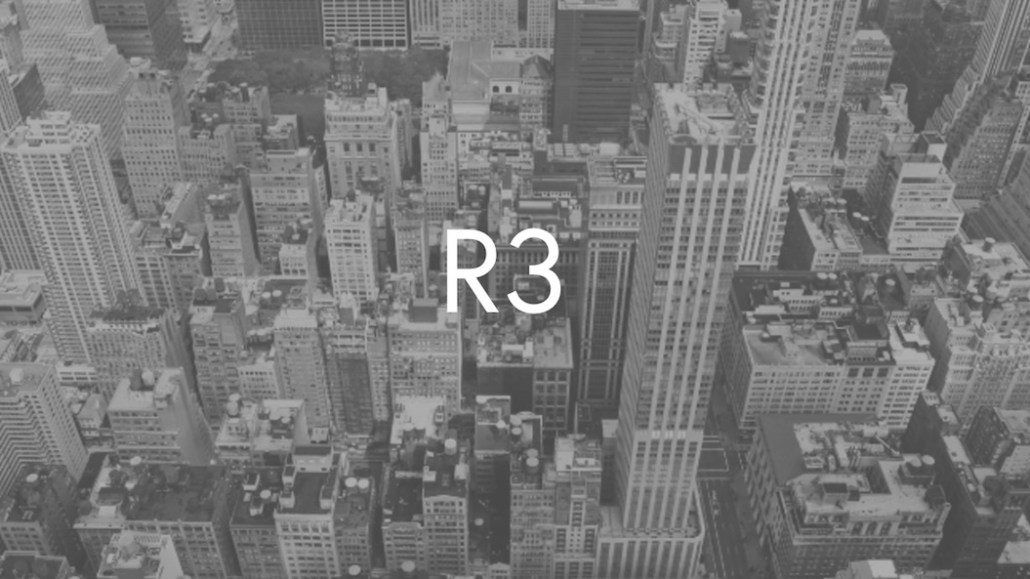Last chance to save on Digiday Publishing Summit passes is February 9

Blockchain has a branding problem, and a recent skirmish involving R3 shed new light on it.
The company, perhaps the most high profile and well funded of blockchain technology companies, had to put out a small fire last week after a presentation in which it said it doesn’t need to use a blockchain.
In the Tuesday afternoon presentation about Corda, its recently released open source technology for financial agreements, it specified that one of Corda’s “pertinent features” does not involve a blockchain ‘because they don’t need one.” An audience member tweeted the slide, social media users reacted and today, headlines about the company ditching a multi-million dollar research effort circulated.
R3 concedes defeat: “No Block Chain, because we don’t need one” pic.twitter.com/tHE3I6U8mN
GAME OVER!— Beautyon (@Beautyon_) February 21, 2017
This is not as big of a deal as it’s made out to be, Charley Cooper, managing director at R3 said Friday in a statement. “We’ve said from the beginning that while Corda is a distributed ledger platform, it is not a traditional blockchain platform and was never designed to be one,” he said.
Blockchains are decentralized, shared ledgers that are updated in near real time, maintained and verifiable by the participants of the network with access to the ledger, and whose information can’t be changed or edited. Blockchains and their positive features, however, came to light through the notoriety of the digital currency bitcoin, which is an open, public network. They’re different from distributed ledgers, which are better suited to major financial institutions like the ones working with R3.
On one hand, the semantics of this don’t matter very much. Until now, industry participants and observers alike have been comfortable throwing around the word blockchain in the broad sense; it’s generally understood people are discussing blockchain the technology, not bitcoin the digital currency. On the other hand, R3 has been particular about keeping “blockchain” out of its official language because the difference between what its building and a first-generation blockchain is so distinct.
While R3 has never objected to being described as a “blockchain” company it has also almost never self-identified using the terminology. The three-year-old company usually just describes itself as a technology company that builds distributed ledger fabric for financial institutions and incorporates all the specifications of the finance industry, which prioritizes data privacy and confidentiality.
“Blockchain is more of a construct or architecture and is equalitarian. DLT is more selective in terms of who gets distributed what,” said Javier Paz, a a senior analyst at consulting firm Aite. “When we think of blockchains we think of bitcoin, ethereum and public, open networks. Distributed ledgers are something more for banks and entities that have to preserve confidentiality.”
When R3 and its technology vendor peers emerged with visions of cherry-picking the best of blockchain technology for financial services, bitcoin puritans flailed and wailed that it couldn’t be done — or if it could, it wouldn’t truly be blockchain technology. That’s a stance the industry seems to have accepted and moved away from now.
In financial services, there’s been an indifference around using the term “blockchain.” People often understand that the blockchain-inspired technology being built for financial services is different from that used to power bitcoin, but have deferred to the term for the sake of simplicity – something R3 admitted to doing itself in a Friday afternoon blog post responding to the frenzy.
“Humans are creatures of habit. As time went on, the term blockchain came to be associated with any type of distributed ledger, even as the technology matured and evolved to meet the needs of different groups of users,” said David Rutter, R3’s founder and managing partner. “This isn’t an issue unique to our space. The marketing team at Canon must have spent countless hours working out how to stop people referring to all copy machines as Xeroxs.”
Many people haven’t fully realized yet that “blockchains” no longer suit everyone or everything, Paz said. Its initial construct no longer suits the ideas that many financial services users of DLT demand – privacy and confidentiality – but essentially R3’s platform can be configured to behave like a blockchain, that’s just not part of the company’s business proposition.
So while a change of terminology might have been met with indifference previously, perhaps the technology and the subset of financial services that are invested in it might be at an evolutionary point that warrants it.
“I prefer the word ‘chaintech,’ which captures the evolution of chain architecture we’ve seen over the last half year,” Paz said. “We started with the first-generation concept of blockchain — where there are nodes and information that gets distributed — but this is where a change of terminology is helpful and necessary to help the evolution.”
More in Marketing

GLP-1 draws pharma advertisers to double down on the Super Bowl
Could this be the last year Novo Nordisk, Boehringer Ingelheim, Hims & Hers, Novartis, Ro, and Lilly all run spots during the Big Game?

How food and beverage giants like Ritz and Diageo are showing up for the Super Bowl this year
Food and beverage executives say a Super Bowl campaign sets the tone for the year.

Programmatic is drawing more brands to this year’s Winter Olympics
Widening programmatic access to streaming coverage of the Milan-Cortina Games is enabling smaller advertisers to get their feet in the door.





